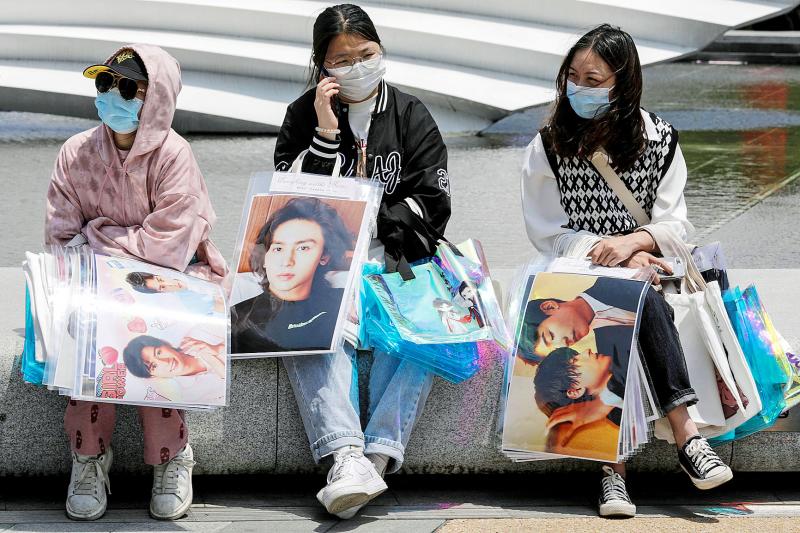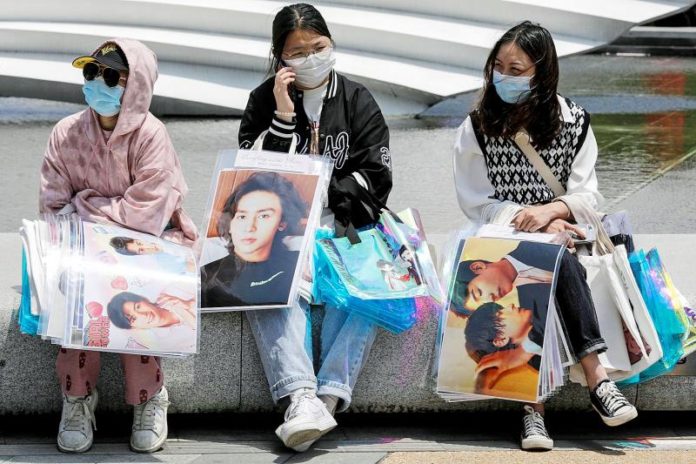-
AFP, BEIJING
Two men exchange longing glances, a frisson of sexual tension in an on-screen relationship which must otherwise go unspoken — China’s “boys’ love” phenomenon is gripping video streamers, slipping by censors of LGBTQ themes with their subtlety.
The genre rose to prominence in 2018, as adaptations of Web novels about same-sex couples, known as dangaiju, were increasingly picked up by on-demand services, propelling Chinese actors to stardom.
In Word of Honor, a blockbusting adventure from video platform Youku, two handsome martial arts heroes develop a close bond, but refer to each other only as “brothers,” as the heavily insinuated romance between protagonists fails to emerge.

Photo: AFP
Although China decriminalized homosexuality in 1997, same-sex marriage is illegal and taboo trails LGBTQ issues. The community is facing renewed pressure, with Web content censored and depictions of gay romance in films banned.
Yet “boys’ love” adaptations are booming, screened by streaming giants such as Youku and Tencent Video, mostly fueled by demand from straight women and their growing interest in a more delicate form of masculinity.
Tickets for a Word of Honor-themed concert in Suzhou sold out in seconds earlier this month, as hundreds of thousands rushed for a spot.
The series quickly racked up millions of views after it was released in February, while Tencent Video reportedly made 156 million yuan (US$24.5 million) from advance viewings of a similar show.
For video platforms in China’s boisterous, competitive streaming sphere, changing social mores means one thing: money.
“In pop culture, creators look to subcultures for new stories or original material,” said Liaoning University lecturer Bai Meijiadai (白梅嘉岱), an expert in fan culture. “The rise of ‘boys’ love’ content suggests the on-screen industry is aware of young women’s consumption power.”
The red pen of the state might have supported the video phenomenon.
Authorities have cracked down on “illegal” writing on the Web, censoring content deemed too risque for Chinese readers.
In 2018, a novelist was sentenced to 10 years in jail for writing and selling “pornographic” books.
“Sexual content in [same-sex] Web novels has reduced since authorities embarked on cyberspace cleanups and platforms introduced review-and-report mechanisms,” Bai said.
This makes their storylines — many of grand, period adventures flecked with martial arts — easier to adapt for television, with more sexually explicit content removed, she added.
About 60 TV adaptations are underway, but the genre attracts mixed reviews among China’s queer communities.
“They break the mold of heterosexual relationships being the norm on screen,” said a gay civil society worker who wanted to be known only as Shuai. “But they do not reflect the LGBT community’s struggles and difficulties.”
Once lead actors attain fame, they also avoid suggestions of gay identity to maintain popularity, he added, doing little to counter the airbrushing out of LGBTQ lives.
The television adaptations mainly appeal to women.
An e-commerce worker surnamed Xu said that “boys’ love” allowed her an escape, unlike many other TV shows that serve a barrage of stereotypes in their depictions of women’s gender roles.
“It allows me to think about fewer things and relax,” the 29-year-old added.
For now, the “boys’ love” industry has steered clear of regulators through subtle portrayals of same-sex moments or “normalizing” shows’ endings.
“For example, you may have deviations in your teenage years, but once you grow up, you still go back to reproductive ‘normalcy,’” Bai said.
Comments will be moderated. Keep comments relevant to the article. Remarks containing abusive and obscene language, personal attacks of any kind or promotion will be removed and the user banned. Final decision will be at the discretion of the Taipei Times.








